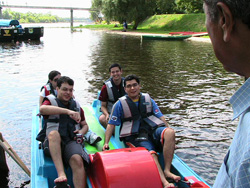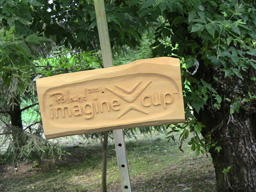WARSAW, Poland — July 7, 2010 — Today at Imagine Cup, it was all about immersing in the local culture. All participating students, except the final six teams, downed their tools and headed to the small town of Pultusk, just north of Warsaw, to experience some of the rich traditions of Polish culture. Pre-arranged activities included attending a concert at the Castle of Pultusk, making dumplings, blacksmithing, relaxing around the lake, playing chess and shopping in the longest market in Europe.

Team Brazil enjoys a break from competition at Imagine Cup to spend some time on the lake.
While the contestants enjoyed some downtime, the pressure on the six finalists continued to mount. The final teams spent last night fixing, adjusting and recalibrating their projects before heading over to the Opera House for final rehearsals Tuesday.
“It’s a tense but terrific atmosphere, and tomorrow is going to be grueling. This is as close to competing in the real world as it gets, and the teams are going to have to pull out all the stops and impress the judges all over again,” said Scott Davis, group marketing manager for Windows Embedded and the Embedded Team captain.
The finalists will be starting from scratch, no points from the previous rounds will be carried over, and will have just 15 minutes to demonstrate to the judges exactly what makes their project stand out. Yesterday, the final six teams in the Embedded Development category were announced. Now take a closer look at the individual teams and their the unique projects and themes that brought them this far.
Team U.K. — A Physical Sense of the World
“I wanted to change the world. I wanted to get my ideas out there and help those who needed them the most. The Imagine Cup was the perfect opportunity to bring together my technical knowledge and my desire to help people,” commented Kevin Pfister from the University of York.
A one-man band, Pfister created Senses, an affordable, mobile and lightweight augmented reality system for blind and partially sighted people, aimed to improve overall quality of life in day-to-day tasks. This can range from reading exercises to identifying objects and avoiding obstacles in the street.
Pfister designed an e-box that can fit neatly into a rucksack, to which a headset and shoulder-mounted camera would be

Imagine Cup 2010 logo adorns Warsaw signage
attached. Custom builds of Windows Mobile and Windows CE 6.0 R3 platforms underpin Senses.
Initially aimed at the U.K. marketplace, Senses would be targeted to charities such as RNIB that have a well-established presence in this area. Pfister’s hopes for the product include generating awareness of the technology with the U.K. National Health Service and other larger health providers.
Team Korea — Calming Road Rage Is Good for Your Heart … and the Environment
“Imagine a world where technology helps save our environment,” encouraged Eunki Kim, Jongmin Park and Hyunah Kim, representing Inha University & Postech.
It’s not easy being green. But one team in the Imagine Cup competition addresses this with their project, R U Gentle, which guides drivers toward using the best driving style to help lower emissions. While good for the environment, it also saves car owners money by lowering fuel consumption.
Did you know that driving 25 mph rather than 30 mph on the road could make a huge difference in the amount of harmful emissions? It’s not a substantial reduction in speed for the driver, though R U Gentle shows the impact of such a change in driving habit.
The R U Gentle device is built on Windows-based technology with more personal features built in, including displays for family pictures, audio for playing recorded voices of family members and even a scent dispenser, all designed to help reduce driver stress and facilitate more responsible and environmentally friendly driving.
Team Taiwan — Giving Businesses a Green Conscience
According to members Yung-Chi Chen, Yi-Sheng Lai and Ming-Chun Lin from National Chiao Tung University, “We found that there is too much waste in our daily life. We produce far too many unnecessary CO2 emissions. We believe we can ensure environmental sustainability across the globe through computer science and technology.”
First-time entrants, SmarterME from Taiwan believe that the Imagine Cup competition is the perfect global stage to show off their device. SmarterME fully utilizes the information technology and network communications for a “smarter meter” system designed for household use. The device records the power consumption in terms of voltage and total current of the AC power in the home.
The team believes that educating people on a small, everyday scale will help them understand how much power consumption they can ultimately save, aiming to save at least 25 percent to 30 percent in electricity consumption. The Taiwanese team would like to see the device hit enterprises in their region within the next 10 years.
The team embraced modern technology platforms available to them, with the SmarterME being operated on a cloud platform and using Windows Mobile and Windows 7 solutions.
Team Romania — Powering Personalized Energy
Valentin Stangaciu, Alexandru Topirceanu and Daniel Volcinschi from Politehnica University of Timisoara explained, “Our project addresses the problem of the energy wasted in every home, every office building and in most data centers.”
These students from Romania tackled the issue of energy wastage. It’s a larger problem than one might think, and their solution, ECoMAP (Energy Control, Monitoring, Analysis and Predictability System), promotes and increases power usage efficiency where it is installed. It completes an extensive survey of power usage patterns over a short period, and then presents a clear overview of the power consumption at the monitored location. This simple device is one of the few solutions in the competition that can be used by both businesses and consumers.
Built on Windows Embedded CE 6.0, the tool makes recommendations to users on how to save energy.
Team France — Growing Old Gracefully
“All of us have had a grandparent that needed assistance after falling. We are trying to find a way to improve that assistance without interfering at all with their daily life or their home,” stated Fabien Heracles, Olivier Conort and Matthieu Perraud from ECE Paris University
A more personal project than other entries this year, GERAS (Geriatric Emergency Recognition and Assistance System) can detect if an elderly person is in danger.
The system is composed of different sensors installed around a user’s house. If the user falls, GERAS detects the fall via a large “intelligent carpet.” The system then automatically contacts emergency help or a pre-set phone number of someone who will contact help. The system also interacts with the user to confirm a detected emergency, contacting emergency personnel if no confirmation is made.
GERAS makes it possible for elderly people to remain in their homes without having to move into an assisted living facility, improving quality of life and helping them maintain their independence. It also offers peace of mind to elderly people’s family and loved ones.
According to the team, their goal could not have been reached without using an embedded system.
Team Russia — A Spoonful of Bits and Bytes
Representing Moscow City Pedagogical University, Russia team members Aleksandr Gordeev, Pavlovsky Vladimir, Victor Yurenkov and Alexey Kashcheev said, “We believe that getting children involved from a young age naturally increases interest in technology around them.”
Many who have watched “Mary Poppins” have thought how great it would be to have a nanny like that. Unfortunately, magical nannies are in short supply, so the Russian team created Robonanny, a human-like robot. Dedicated to helping care for children, this moving and talking robot is built on the Windows Embedded CE platform.
Controlled by an e-box via radio, Robonanny can perform a number of useful educational functions such as performing some degree of physical activity with children and facilitating different learning activities. Research has shown that children learn much better and gain those important communication skills by learning from interactive gadgets instead of books or shows. This is especially helpful with children who have some specific communication disabilities and need more dedicated one-on-one time.
Final presentations from these six teams take place Wednesday, with the winner announced during Thursday’s evening session.
Continue to check the Windows Embedded News Center and follow @msftweb on Twitter for the latest happenings coming out of Poland this week. Additional images from the competition can also be viewed on the Windows Embedded Flickr page.




